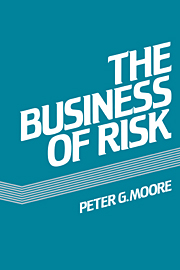Book contents
- Frontmatter
- Contents
- Preface
- 1 Introduction
- 2 The determination of probabilities
- 3 Subjective risk determination
- 4 Calibration and training
- 5 The concept of utility
- 6 Project investment risks
- 7 Risk and financial institutions
- 8 Risk and portfolio investment
- 9 Gambling and speculation
- 10 Physical risk and its perception
- 11 Morbidity and medicine
- 12 Risk in public policy
- Appendix A Handling probabilities
- Appendix B Decision-making procedures
- Appendix C Reduction of risks
- Exercises
- Bibliography
- Index
- Frontmatter
- Contents
- Preface
- 1 Introduction
- 2 The determination of probabilities
- 3 Subjective risk determination
- 4 Calibration and training
- 5 The concept of utility
- 6 Project investment risks
- 7 Risk and financial institutions
- 8 Risk and portfolio investment
- 9 Gambling and speculation
- 10 Physical risk and its perception
- 11 Morbidity and medicine
- 12 Risk in public policy
- Appendix A Handling probabilities
- Appendix B Decision-making procedures
- Appendix C Reduction of risks
- Exercises
- Bibliography
- Index
Summary
Tesman: But good heavens, we know nothing of the future.
Lovborg: No, but there is a thing or two to be said about it all the same.
Ibsen: Hedda GablerThe background
Risk is about future happenings and enters everybody's lives at numerous points. A mountaineer going on an expedition can break a leg, or be killed. A business person keeping an appointment in Birmingham may be involved in a serious road accident. A traveller in Africa may contract dysentery. A gambler entering a casino could lose all his capital in a night. The company in which an individual has invested may go into liquidation. An entrepreneur starting a new business venture can lose his capital when an expected market fails to materialize. A government may be thrown off course when a major trading bloc operates a cartel against it.
Economic progress is impossible without taking risks; indeed it is arguable that even the maintenance of an economic status quo involves risk taking. Hence risk has about it an aura of achievement and progress, communities commonly rewarding those who handle difficult risk situations successfully. Effective handling of risks requires first their assessment and, secondly, their subsequent incorporation in the decision-making process. Exploring these themes in a variety of business, economic, political and social settings forms the primary objective of this book.
- Type
- Chapter
- Information
- The Business of Risk , pp. 1 - 15Publisher: Cambridge University PressPrint publication year: 1983



